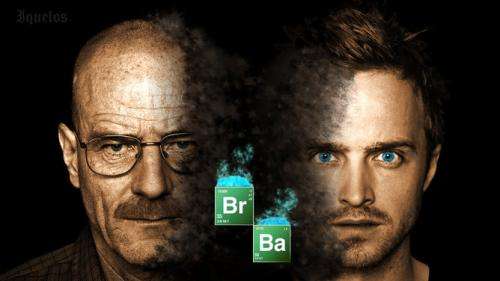Twitter app stops you Breaking Bad news to good people

WARNING: This article contains a spoiler. Don't worry though, it's not what happens in the final episode of Breaking Bad. Even academics don't get early access.
This week, Netflix has created a handy service called the Spoiler Foiler, which blocks out any tweets that might reveal details of the finale of Breaking Bad, to be aired this Sunday and Monday.
This seemingly nifty innovation allows the average Twitter user to block tweets with certain words from their stream so they can avoid posts about the plot from other users who already know what will happen to Walt, Jesse and that charming chap Uncle Jack.
The premise is to avoid the so-called internet nasties who have either secured an illegal copy of the episode, or had access to insider knowledge about the plot. This would effectively ruin the surprise and will dilute the anxiety effect that has built over five series of watching a bumbling high school chemistry teacher metamorphose into a ruthless drug baron by way of a meth lab started in the back of a camper van.
There has already been a significant amount of chat online about the plot of the final episode and the reaction to it has been unique to say the least. The digital community has put its foot firmly down and said no to spoilers. With the Spoiler Foiler, Netflix appears to have responded to this call.
The service reflects the new way we now watch television. We no longer have to plant ourselves in the living room at a certain time on a certain day to watch must-see shows.
Netflix is one of many services that allow us to access "box set" TV at our own pace. Hardcore Breaking Bad fans have just one hour of viewing left to go but others are a long way behind. Some are still on season one or season two. They don't even know about that terrible thing that happened to that pivotal character after that other shocking event occurred that we really can't talk about right now.
While this does have the appearance of empowering the everyday consumer who wants to watch their favourite show in their own time, the real winners are AMC and Netflix. The TV watching world is demanding protection from the modern threat of spoilers but, in doing so, it has also revealed that it is hopelessly locked in and open to a distinctly old-fashioned trick.
Those most rigorously rubbing their hands with glee will be the marketing teams who are no doubt charging eye watering premiums for the advertising space on either side of the final episode. Breaking Badders have shown they are willing to take any amount of advertising thrown at them in their dedication to following Walt's every calamity. It's a timeless business model that makes Gus Fring look like an amateur.
Still, no harm in adding to well-established revenue streams with a few innovations. With the increase of digital TV services and the number of web-enabled devices per household, the concept of "dual-screening" has now become commonplace on sitting room couches across the globe.
We are beginning to see clever methods by media outlets capitalising on this flow of online conversation before during and after a show has been aired. Take a look at Zeebox for an example of this. You could say that the TV show itself is becoming secondary to the conversation with the consumer.
This is not a new concept however. Cast your mind back to the infamous "Who Shot Mr. Burns?" episodes of The Simpsons. Matt Groenig and co had to produce multiple endings to stop the now legendary whodunit from becoming public knowledge. To trick the show's writing and producing team, alternative endings with Moe, Apu, Barney and Tito doing the deed were created and the real assassin was only revealed when the episode was aired (SPOILER – it was Maggie!). At the time, bookmakers in Las Vegas had thousands riding on the result, the media was all over it and millions of viewers across the globe tuned in to find out the truth. These days, everyone involved could have made even more money using social media.
Excluding tweets can be a valuable tool in stemming the flow of clutter. It is not an easy task and is, at the moment, reserved for the avid technophile but the Breaking Bad Spoiler Foiler may lead the way for future applications which might allow us to block out internet activity that spoils our fun in other parts of our lives. There is already a service that allows you to replace pictures of your friend's babies on your Facebook feed with images of bacon and who knows, maybe we will soon get a spam clamper, a troll trap or a homophobia halter.
I know I will be watching the episode on Monday evening and will have two firm digital fingers in my ears until that time. I have already had the infamous Red Wedding episode of Game of Thrones ruined for me; I hope my digital inner circle will keep schtum until then.
We watch on in nervous anticipation.
PS: Please don't kill Jesse!
Source: The Conversation
This story is published courtesy of The Conversation (under Creative Commons-Attribution/No derivatives).
![]()

















